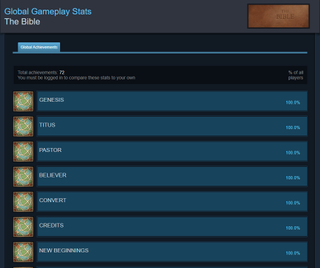2022 years later the Bible gets a Steam version
And gamers are already heading to hell for speedrunning the achievements.

Rejoice all ye gamers: finally, the Bible has arrived on Steam. Now you can read through Biblical passages with "an original soundtrack", listen to an audiobook version, look at "an extensive trivia section" and, in the most holy and pious of manners, earn achievements. The developer is not God, but the judiciously named Bible Games. Well they certainly know what they're about.
Can you save the game? My child, this game may save you.
Fair warning—the Bible is a classic but it's getting on. This heavenly vision won't support ray tracing now or indeed ever, and gamers should know that the hero doesn't even turn up until the second half: though you certainly won't have any complaints about length and the ending's a revelation.
Now, some fans do say that the New Testament is more like a DLC. It re-uses a lot of assets from the first time around and arguably feels unfinished. The worst thing though is that this arguably did a Mass Effect 3 before we'd even heard of that Shepard: Jesus had a really small but dedicated fanbase that whined so hard the devs ended up bringing him back.
There's also no word on whether this will support offshoots like the Gnostic Gospels, a non-canon expansion pack from a support studio.
It is easy to get the achievements though. Hilariously the Bible's 72 achievements mean it has a Global Gameplay Stats page on Steam where we can see that, because the achievements are all just awarded for opening a particular book of the text, most players have just gone through and 100%-ed it.
Yes, gamers are speedrunning the Bible for achievements. But remember John 2:16 and blame not the text: "For everything in the world—the lust of the flesh, the lust of the eyes, and the pride of life—comes not from the Father but from the world."
The biggest gaming news, reviews and hardware deals
Keep up to date with the most important stories and the best deals, as picked by the PC Gamer team.

On a more serious note, Biblical aficionados may want to know that this is based on the New King James Version (NKJV) of the Bible, an updated version of the classic King James text first published in 1982. This version of the text is not universally popular, and arguably lacks the poetry of the more archaic original.
One of my favourite pieces of trivia about the original King James Bible is that certain scholarly estimates put about 80% of it down to a bloke called William Tyndale. This guy was what you call ahead of his time: probably too far ahead of his time. Tyndale believed scripture should be available in the common vernacular, but religious elements of the time said no and, for his service in translating the texts into Early Middle English, was tied to a stake, strangled, and then burned.
I think you got him, guys. Wonder what they would have made of a Steam edition with trivia: Bible Games is lucky it's not operating in the 1520s is all I'll say.




Finally, I offer you this parable from PC Gamer's own Chris Livingston: "I joined a Presbyterian youth group because I had a crush on a girl who was in it, which led to me reading from the Bible in front of the entire congregation on Christmas day. Was not struck by lightning. Some old lady told me she was in tears from my reading, I had literally never opened a Bible before."
Truly, the book that never stops giving. The Bible is out now on Steam, bizarrely enough in the "indie games" category, and has a launch discount of 33%. Or you could just nick one from the next hotel you stay in, and go to hell.
Rich is a games journalist with 15 years' experience, beginning his career on Edge magazine before working for a wide range of outlets, including Ars Technica, Eurogamer, GamesRadar+, Gamespot, the Guardian, IGN, the New Statesman, Polygon, and Vice. He was the editor of Kotaku UK, the UK arm of Kotaku, for three years before joining PC Gamer. He is the author of a Brief History of Video Games, a full history of the medium, which the Midwest Book Review described as "[a] must-read for serious minded game historians and curious video game connoisseurs alike."
Most Popular






